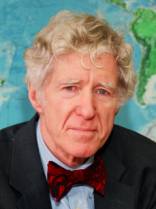|
|
EARTH NEWS ARCHIVED 2003-2007croll down)
The 2007 Heiligendamm G8 Summit: Outcomes for Africa
The Great Iraq Swindle
HIYAS announce 250K donation to treat Chernobyl Thyroid patients in greater New York
UNAIDS reafirms commitment to AIDS goals at G8 summit
Ted Turner: For a real people lift - Work beyond the G-8
Billions face climate change risk
Study: 'Tipping point' for climate is near
World is warmer than it has been for 1200 years
The Amazonian rainforest is being destroyed at double the rate of all previous estimates
Bush has reversed more environmental progress in the past eight months than Reagan did in a full eight years
Sign the ONE Declaration
A Historic 52 billion in Third World debt cancelled
G8 Finance Ministers’ Conclusions on Development, London,
Reaction from Bono and DATA on debt cancellation for the world's poorest
World to celebrate Kyoto Protocol start
US Occupation Authority in Iraq Lost Track of Nearly $9B
Tsunami death toll in Indonesia soars to 800,000
UN Unveils Action Plan to Save Millions of Lives
The 2007 Heiligendamm G8 Summit: Outcomes for Africa
06.13.07
At the 2007 G8 Summit in Heiligendamm, Germany, world leaders focused on Africa’s
future for the second time in three years, a reflection of the remarkable
advances underway in African development. In the end, the Heiligendamm summit did
not deliver the big increases in resources needed to follow through on existing
promises made by donors in 2005. While some leaders stepped up and fought hard
for concrete commitments in areas such as health and education, the final
Communiqué mostly avoided specific and accountable commitments. DATA criticized
the Communiqué for its failure to commit the G8 to specific accountable targets.
However, going forward, DATA will work to make these vague commitments firm and
accountable and get the G8 to agree to an ambitious timetable for delivery of the
additional $25 billion promised to Africa in 2010.
The following provides an overview of outcomes from the 2007 G8 Africa Communiqué.
OVERALL DEVELOPMENT ASSISTANCE
Reiteration of 2005 commitment to increase aid to Africa by $25 billion by 2010
Importantly, the G8 included in the communiqué a reiteration of its 2005
commitment to increase Official Development Assistance (ODA) to Africa by $25
billion a year by 2010 (starting from a 2004 baseline). The G8 did not, however,
commit to an accountable timetable for delivering its 2005 aid promises for Africa.
HEALTH
HIV/AIDS TB AND MALARIA
Commitment to provide $60 billion for AIDS, Tuberculosis and Malaria
The only significant aid announcement for Africa at Heiligendamm was a G8
commitment to provide a total of $60 billion to fight AIDS, TB and malaria. While
this big figure grabbed a lot of headlines, it is less significant than it first
seems. The $60 billion announcement is misleading for three reasons:
1. Despite being in the Africa Communiqué, it is a global commitment, not just
for Africa;
2. It is a cumulative figure to be delivered over an unspecified time period
and will not make $60 billion available in any single year;
3. It includes existing spending on the three diseases and is not $60 billion
in new money.
Half of the $60 billion will come from the US, which recently announced a
commitment to spend $30 billion between 2009-2013 to fight HIV/AIDS. According to
DATA’s analysis, the $60 billion commitment, using the most generous assumptions,
will add at most $2.4 billion in additional aid to Africa in 2010, and $3 billion
globally. If this additional $2.4 billion came through in 2010, it would be
almost 10 percent of the $25 billion in additional aid for Africa promised by
2010. This would be significant and welcome, but as the only noteworthy aid
pledge to come out of Heiligendamm, it is not enough to put the G8 on track to
deliver its overall aid promises to Africa.
HIV/AIDS
Commitment to provide treatment to 5 million people
The G8 reaffirmed its commitment to scale up towards “universal access” to
treatment by 2010 and included a pledge to put 5 million people on treatment. It
is not clear if this commitment is global or just for Africa and the Communiqué
did not include a specific target date, reflecting likely disagreement in G8
negotiations.
UNAIDS defines universal access as providing treatment to 80% of people in most
urgent need by 2010. The commitment to put 5 million people on treatment, if
understood as a global commitment, falls far short of the goal of universal
access by 2010. Reaching this goal would require putting roughly 10 million
people on treatment. If the commitment is intended to just focus on Africa, then
it would achieve universal access on the continent, using a previously accepted
universal access estimate of 4 million people in need in 20101.
UNAIDS is in the process of updating its estimates for the number of people
needing AIDS treatment. Preliminary figures suggest the numbers are rising
compared to older estimates. The number of people requiring treatment globally by
2010 is now projected to be 11 million and could be as high as 16 million. The
number of people requiring treatment in Africa by 2010 is now estimated to be
between 7 million and 11 million. Therefore, according to these estimates,
achieving universal access in Africa (providing treatment to 80% of those in
urgent need) would require putting between 5.6 million and 8.8 million people on
treatment.
Pediatric HIV/AIDS / Prevention of Mother-to-Child Transmission (PMTCT)
The G8 included important statements on the need to provide universal coverage of
PMTCT programs by 2010 and meet the resource needs for providing pediatric
treatment. The G8 also acknowledged the need to reduce financing gaps in the
areas of maternal and child health and voluntary family planning, as well as the
need to strengthen effective programs to end violence against women, as essential
parts of the response to AIDS.
MALARIA
Reiteration of 2005 Gleneagles malaria commitment
The G8 included a reiteration of its 2005 commitment to reach 85% of those in
need with malaria prevention and treatment by 2015 and achieve a 50% reduction in
malaria-related deaths. However, the Communiqué did not include a reiteration of
the 2005 commitment to spend an additional $1.5 billion annually on this effort.
Recent estimates place the financing required to fight malaria in Africa at an
average of $3.1 billion a year between 2007-2015.
GLOBAL FUND TO FIGHT AIDS, TB, AND MALARIA
No specific financial pledges; acknowledgment of long-term resource need
The G8 did not make any specific financial pledges to the Global Fund. The
Communiqué acknowledged the agreed-upon Global Fund target size of $6-$8 billion
a year by 2010 and included a general pledge to replenish the Global Fund and
provide long term predictable funding.
ACCESS TO MEDICINES
Limited focus on access to medicines
The G8 recognized the importance of access to medicines for HIV/AIDS, however,
the Communiqué is limited in its scope on this issue. First, it only refers to
one TRIPS flexibility tool (the TRIPS and public health paragraph 6 mechanism
developed in 2003) which has been criticized as ineffective. Secondly, it only
addresses the issue of access to medicines for HIV/AIDS and ignores the
importance of other pharmaceuticals for diseases such as TB, hepatitis, cancer, etc.
EDUCATION
No specific financial pledge. General commitment to meet funding shortfalls in 2007
The G8 did not make an explicit financial commitment to fill the external
financing gaps of the Fast Track Initiative (FTI) endorsed countries. Instead,
the Communiqué states the G8 will work to “meet shortfalls” in the FTI endorsed
countries, which the Communiqué acknowledges to be $500 million for the 31
endorsed countries. Of these 31 endorsed countries, 19 are in Africa and their
external financing gaps collectively total $367 million of the $500 million.
TRADE
No new commitments
The G8 Declaration on trade contains no new commitments. The Declaration
reiterates the need for a conclusion to the Doha Development Agenda and refers to
the statement by the US, EU, Brazil and India (the so-called G-4) in April
stating an intention to make progress in the coming weeks with the aim of
completing negotiations by the end of 2007. The Declaration calls on the
leadership to “translate the continued commitment on political level into
tangible results,” emphasizes the importance of the development dimension of the
negotiations, and the need for close cooperation among all WTO members. In the
Africa Communiqué, the G8 simply repeated their commitment to increase aid for
trade funding to a total of $4 billion for all developing countries. This amount
does not come close to meeting Africa’s aid for trade needs, as preliminary
estimates show that aid for trade needs for Africa alone are approximately $12-13
billion annually.
GOVERNANCE
No new commitments
The G8 reiterated its support for the African Peer Review Mechanism and the
Extractive Industries Transparency Initiative and a desire to assist African
countries in strengthening these efforts. The G8 did not mention increasing
financial support to these efforts, as they did in 2005 at Gleneagles. Similarly,
the Communiqué includes no mention of the G8’s support for the ratification and
implementation of the UN Convention Against Corruption and its provisions for the
recovery of stolen assets. It also includes no mention of the OECD Convention
Against the Bribery of Foreign Public Officials.
PEACE AND SECURITY
No new commitments
The G8 reaffirmed its commitment to the Africa Standby Force and pledged to
devote greater attention to confliction prevention, reconstruction,
reconciliation and development in post-conflict countries.
G8 leaders issued a separate statement on Darfur, which expressed deep concern
about the security and humanitarian situation in Darfur and in neighboring Chad
and Central African Republic. Leaders stressed the need for an immediate
ceasefire and an end to the targeting of civilians and aid workers so that a
political agreement can be negotiated.
1 - “AIDS in Africa: Three scenarios to 2025” UNAIDS. March 2005.
- WORK BEYOND THE G-8 Maximnews.com
-
The impact of climate change has been a major source of dispute Billions of people face shortages of food and water and increased risk of flooding, experts at a major climate change conference have warned.
The bleak conclusion came ahead of the publication of a key report by hundreds of international environmental experts. Agreement on the final wording of the report was reached after a marathon debate through the night in Brussels. People living in poverty would be worst affected by the effects of climate change, the gathered experts said.
"It's the poorest of the poor in the world, and this includes poor people even in prosperous societies, who are going to be the worst hit," said Rajendra Pachauri, chairman of the Intergovernmental Panel on Climate Change (IPCC).
Mr Pachauri said those people were also the least equipped to deal with the effects of such changes.
Outlining the report's findings, Dr Martin Parry, co-chairman of IPCC Working Group II, said evidence showed climate change was having a direct effect on animals, plants and water.
"For the first time, we are no longer arm-waving with models; this is empirical data, we can actually measure it," he told a news conference.
Dr Parry outlined the four areas of the world now thought to be the most vulnerable to climate change:
UNITED NATIONS - /www.Maximnews.com.@ U.N./ - 12 June 2007 – Say what you will about the annual Group of Eight summit: talking heads, "rich countries club," ineffective.
Now take those comments and shelve them, because the issues that were discussed through Friday at the G-8 summit in Germany — global poverty, climate change and economic prosperity — lie at the heart of our planet's future, and it is time that more than just the heads of state have a voice in these issues.
As an entrepreneur and businessman, I have come to realize the extent to which global issues are business issues. Energy, health and poverty impact how businesses operate, expand, trade and engage as corporate citizens. Likewise, businesses can offer developing countries means to grow and develop. This is the idea behind one of the major G-8 themes this year: "Investments, Innovations and Sustainability." Under this general theme, heads of state discussed the nuts and bolts of issues that will impact business leaders' and entrepreneurs' ability to more broadly engage in and benefit from a global economy.
In an increasingly interdependent world, ensuring that developing countries grow in a way that supports democratic government, environmental stability, transparent markets, and a healthy and educated population impacts more than just the people in those countries. It impacts the health and landscape of global business and innovation. Think of it this way: Two billion people around the world live on less than $2 a day. This means there are 2 billion people who would utilize products and services if the barriers to economic opportunity were removed. In this need is great opportunity.
However, there is also great risk. If this poverty is ignored, the world can count on increased warfare and strife, greater environmental destruction, broader spread of disease and widespread starvation or malnutrition.Luckily, there is already a roadmap in place to address these issues: The Millennium Development Goals. (link) These eight time-bound goals, devised by development experts and agreed to by all United Nations member states, have become commonly accepted as the way to measure development progress.
The MDGs include halving extreme poverty and hunger, achieving environmental sustainability, reversing the spread of HIV/AIDS and other diseases, developing a global partnership for good governance, development and poverty reduction and more by 2015. This roadmap, however, is faltering and needs stronger support, especially from the business community.
We are now halfway to the MDGs deadline of 2015 and are falling way short of the funding necessary to achieve the goals.A united call to government leaders from the business community to commit more fully to the MDGs, including helping countries invest in education, health and a clean energy future, as well as removing barriers to trade that keep poor countries from helping themselves, has great credibility and leverage. Furthermore, the attainability of the MDGs requires entrepreneurial ingenuity and a business skill-set.
It takes smart entrepreneurs and trained managers to find ways to reduce greenhouse gas emissions, raise people out of poverty, supply HIV/AIDs patients with treatments and more.
I recently got into the business of selling solar power, realizing the energy needs of the world are expanding and more people require access to low-cost, energy-saving alternatives.
When you boil these global challenges down to their essence, what is at stake in the long-term if we fail in this effort — our livelihood and life's work, our global security, the welfare of our very children — is far greater than the risk of not getting involved.
I urge you, take action now.
~~~~~~~~~~~~~~~
Labels: United Nations, U.N.
Billions face climate change risk
|
|
 |
|
Manila Bay, Philippines Photo by Alan Geoghegan |
Friday, 6 April 2007 - BBC News |
The arctic, where temperatures are rising fast and ice is melting
Sub-Saharan Africa, where dry areas are forecast to get dryer
Small islands, because of their inherent lack of capacity to adapt
Asian mega-deltas, where billions of people will be at increased risk of flooding
In Europe, scientists had previously warned about the long term dangers of the collapse of the Gulf Stream, a warm ocean current that makes its way from the Caribbean towards Europe's west coast. A huge injection of freshwater from the melting of Greenland's icecap could interfere with the current, causing Europe's temperatures to plunge, they said.
But recent observations suggest that if it does happen, it will not be any time soon.
"It is very unlikely that the Gulf Stream will shut down during this century," said Dr Parry. "Even if it does, Europe will still become warmer."
Scientists and politicians have welcomed the report.
"This further underlines both how urgent it is to reach global agreement on reducing greenhouse gas emissions and how important it is for us all to adapt to the climate change that is already under way," European Environment Commissioner Stavros Dimas told the Reuters news agency.
READ THE IPCC FINDINGS
Climate Change 2007: Climate Change Impacts, Adaptation and Vulnerability- "This is another wake up call for governments, industry and individuals. We now have a clearer indication of the potential impact of global warming, some of which is already inevitable," said Martin Rees, president of the Royal Society.
"The challenge is now to support those people living in the most vulnerable areas so that they are able to adapt and improve their ways of life."
The wording of the summary of the report, which will be sent to world leaders in time for a G8 summit of industrialised nations in June, was finally decided after scientists and government officials from more than 100 countries worked through the night.
Several delegations, including the US, Saudi Arabia, China and India, had asked for the final version to reflect less certainty than the draft.
It is the second in a series of IPCC reports coming out this year, together making up its fourth global climate assessment.The first element, on the science of climate change, released in February, concluded it is at least 90% likely that human activities are principally responsible for the warming observed since 1950.The third part, due in May, will focus on ways of curbing the rise in greenhouse gas concentrations and temperature.
A fourth report in November will sum up all the findings.
The Great Iraq Swindle
How Bush Allowed an Army of For-Profit Contractors to Invade the U.S. Treasury
--From Issue 1034 Posted Aug 23, 2007 8:51 AM Read the FULL aricle here
How is it done? How do you screw the taxpayer for millions, get away with it and then ride off into the sunset with one middle finger extended, the other wrapped around a chilled martini? Ask Earnest O. Robbins -- he knows all about being a successful contractor in Iraq.
You start off as a well-connected bureaucrat: in this case, as an Air Force civil engineer, a post from which Robbins was responsible for overseeing 70,000 servicemen and contractors, with an annual budget of $8 billion. You serve with distinction for thirty-four years, becoming such a military all-star that the Air Force frequently sends you to the Hill to testify before Congress -- until one day in the summer of 2003, when you retire to take a job as an executive for Parsons, a private construction company looking to do work in Iraq.
Now you can finally move out of your dull government housing on Bolling Air Force Base and get your wife that dream home you've been promising her all these years. The place on Park Street in Dunn Loring, Virginia, looks pretty good -- four bedrooms, fireplace, garage, 2,900 square feet, a nice starter home in a high-end neighborhood full of spooks, think-tankers and ex-apparatchiks moved on to the nest-egg phase of their faceless careers. On October 20th, 2003, you close the deal for $775,000 and start living that private-sector good life.
A few months later, in March 2004, your company magically wins a contract from the Coalition Provisional Authority in Iraq to design and build the Baghdad Police College, a facility that's supposed to house and train at least 4,000 police recruits. But two years and $72 million later, you deliver not a functioning police academy but one of the great engineering clusterfucks of all time, a practically useless pile of rubble so badly constructed that its walls and ceilings are literally caked in shit and piss, a result of subpar plumbing in the upper floors.
You've done such a terrible job, in fact, that when auditors from the Special Inspector General for Iraq Reconstruction visit the college in the summer of 2006, their report sounds like something out of one of the Saw movies: "We witnessed a light fixture so full of diluted urine and feces that it would not operate," they write, adding that "the urine was so pervasive that it had permanently stained the ceiling tiles" and that "during our visit, a substance dripped from the ceiling onto an assessment team member's shirt." The final report helpfully includes a photo of a sloppy brown splotch on the outstretched arm of the unlucky auditor.
When Congress gets wind of the fias-co, a few members on the House Oversight Committee demand a hearing. To placate them, your company decides to send you to the Hill -- after all, you're a former Air Force major general who used to oversee this kind of contracting operation for the government. So you take your twenty-minute ride in from the suburbs, sit down before the learned gentlemen of the committee and promptly get asked by an irritatingly eager Maryland congressman named Chris Van Hollen how you managed to spend $72 million on a pile of shit.
You blink. Fuck if you know. "I have some conjecture, but that's all it would be" is your deadpan answer.
The room twitters in amazement. It's hard not to applaud the balls of a man who walks into Congress short $72 million in taxpayer money and offers to guess where it all might have gone.
Next thing you know, the congressman is asking you about your company's compensation. Touchy subject -- you've got a "cost-plus" contract, which means you're guaranteed a base-line profit of three percent of your total costs on the deal. The more you spend, the more you make -- and you certainly spent a hell of a lot. But before this milk-faced congressman can even think about suggesting that you give these millions back, you've got to cut him off. "So you won't voluntarily look at this," Van Hollen is mumbling, "and say, given what has happened in this project . . . "
"No, sir, I will not," you snap.
". . . 'We will return the profits.' . . ."
"No, sir, I will not," you repeat.
Your testimony over, you wait out the rest of the hearing, go home, take a bath in one of your four bathrooms, jump into bed with the little woman. . . . A year later, Iraq is still in flames, and your president's administration is safely focused on reclaiming $485 million in aid money from a bunch of toothless black survivors of Hurricane Katrina. But the house you bought for $775K is now -assessed at $929,974, and you're sure as hell not giving it back to anyone.
"Yeah, I don't know what I expected him to say," Van Hollen says now about the way Robbins responded to being asked to give the money back. "It just shows the contempt they have for us, for the taxpayer, for everything."
Operation Iraqi Freedom, it turns out, was never a war against Saddam -Hussein's Iraq. It was an invasion of the federal budget, and no occupying force in history has ever been this efficient. George W. Bush's war in the Mesopotamian desert was an experiment of sorts, a crude first take at his vision of a fully privatized American government. In Iraq the lines between essential government services and for-profit enterprises have been blurred to the point of absurdity -- to the point where wounded soldiers have to pay retail prices for fresh underwear, where modern-day chattel are imported from the Third World at slave wages to peel the potatoes we once assigned to grunts in KP, where private companies are guaranteed huge profits no matter how badly they fuck things up.
And just maybe, reviewing this appalling history of invoicing orgies and million-dollar boondoggles, it's not so far-fetched to think that this is the way someone up there would like things run all over -- not just in Iraq but in Iowa, too, with the state police working for Corrections Corporation of America, and DHL with the contract to deliver every Christmas card. And why not? What the Bush administration has created in Iraq is a sort of paradise of perverted capitalism, where revenues are forcibly extracted from the customer by the state, and obscene profits are handed out not by the market but by an unaccountable government bureauc-racy. This is the triumphant culmination of two centuries of flawed white-people thinking, a preposterous mix of authoritarian socialism and laissez-faire profit-eering, with all the worst aspects of both ideologies rolled up into one pointless, supremely idiotic military adventure -- American men and women dying by the thousands, so that Karl Marx and Adam Smith can blow each other in a Middle Eastern glory hole.
It was an awful idea, perhaps the worst America has ever tried on foreign soil. But if you were in on it, it was great work while it lasted. Read the FULL aricle here
Study: 'Tipping point' for climate is near
2/27/2007 By Patrick O'Driscoll, USA TODAY
Declaring there is "no more time for delay," an international panel of scientists urged the world's nations Tuesday to stave off climate-change "catastrophe" by boosting clean-energy research and sharply cutting industrial emissions that fuel global warming.
Otherwise, Earth this century could cross a climate threshold or "tipping point that could lead to intolerable impacts on human well-being," says the 166-page report prepared for the United Nations. It was written by 18 experts in climate, water, marine science, physics and other disciplines, seven of them Americans.
"It is still possible to avoid an unmanageable degree of climate change, but the time for action is now," says panelist John Holdren, a Harvard University professor of environmental policy.
Without action, the panel says, a litany of harmful consequences awaits: the spread of disease, less fresh water, more and worse droughts, more extreme storms and widespread economic damage to farming, fishing and forests. In the USA, which emits about 25% of the world's carbon dioxide, it could mean more intense hurricanes, heat waves, wildfires and droughts.
The two-year study, issued by the U.N. Foundation, says the risk of tipping over that climate threshold rises sharply if Earth's temperature increases 3.6 to 4.5 degrees above what it was in 1750 (it is 1.2 degrees above that point now). That year marked the start of the Industrial Revolution. It led to the widespread burning of coal, oil and other fossil fuels that generate carbon dioxide, the main heat-trapping "greenhouse gas" blamed for global warming.
The scientists say a climate turnaround will take a huge effort. They call for the world's carbon emissions to level off by 2015-2020, then to be reduced by another one-third by the end of the century. Without action, they say, temperatures could rise 11 degrees by 2100.
The report comes three weeks after the Intergovernmental Panel on Climate Change laid out the latest evidence that human action — burning fossil fuels and deforesting the land — is mostly to blame for global warming.
Tuesday's report recommends a dramatic increase in development and use of "biofuels" such as ethanol to replace oil. It also calls for an immediate shift in power-plant construction away from traditional coal-burners to high-tech designs that capture and hold the carbon dioxide they produce.
The world should spend three to four times more on such advanced energy technology, the scientists add. The USA spends almost $3 billion a year now.
The report also suggests nations define a new category of "environmental refugee" to prepare for people who must flee the extreme effects of climate change, such as rising sea levels.
The world is warmer than it has been for 1200 years, By Mike Toner The Sydney Morning Herald February 11, 2006
GLOBAL warming in the past century has been greater than any other shift in the world's climate over the past 1200 years, researchers have reported.
The analysis of data from tree rings, shell fossils, ice cores and temperature measurements from 14 locations on three continents shows that the current warming trend is the most extensive change - warm or cold - since the time of the Vikings.
Reporting their findings in the journal Science, Timothy Osborn and Keith Briffa, climatologists at the University of East Anglia, home to the leading British climate research centre, stop short of blaming the 20th-century warming on industrial emissions or other human factors.
But they say the geographic extent of the warming is more widespread and more pronounced than the one that turned Greenland green 1000 years ago.
Their analyses of tree ring and other climate "proxies" from Europe, Asia and North America show two other pronounced climate shifts during the same period: the Medieval Warm Period from 890 to 1170, and the Little Ice Age, which gripped the northern hemisphere from 1580 to 1850.
The medieval warming, which encouraged the Vikings to settle in previously inhospitable regions of Greenland and Iceland, is sometimes cited by critics of modern global warming theories as evidence that the Earth can experience widespread warming independent of human activity.
"It's good that they [Osborn and Briffa] acknowledge that the last thousand years contained two warm periods with a cold one in between," said Fred Singer, president of the US-based Science Policy Project, which frequently disputes claims of global warming. "But it still doesn't prove that the 20th century was unique."
While the study's temperature measurements go back only to the 1800s, the researchers were able to reconstruct the northern hemisphere's climate back as far as the ninth century.
Researchers correlated records with 14 long-term climate proxies, ranging from shell fossils in Chesapeake Bay in the US to tree rings in Mongolia.
"Both individually and taken as a whole, these reconstructions support the conclusion that it is likely that the late 20th century was the warmest period in the past millennium or longer," Dr Osborn says. Averaged across the globe, the increase in temperatures is numerically small - about one degree above normal, and about two degrees warmer than during the late 1800s. The increase, however, has been especially sharp in recent years, with all 10 of the warmest years on record occurring since the mid-1990s.
The warming has been linked to accelerated melting of mountain glaciers and polar ice sheets throughout the world, warmer sea surface temperatures, the earlier arrival of spring in the northern hemisphere and other changes. Many scientists predict the warming will increase if man-made releases of carbon dioxide and other greenhouse gases are not curbed.
An e-mail forwrded by dad: this article is not archived anymore,
though they do have some good information here. www.grist.org
http://www.grist.org/comments/soapbox/2006/01/12/mckibben/index.html
Climate change is pushing this easygoing enviro over the edge
By Bill McKibben 12 Jan 2006 (excerpt)
.....By get, I don't mean understanding the chemistry of carbon dioxide, or the
importance of the Kyoto Protocol, or something like that -- pretty much
everyone who thinks of themselves as an environmentalist has reached that
point. By get, I mean understanding that the question is of transcending
urgency, that it represents the one overarching global civilizational
challenge that humans have ever faced. That it's as big as the Bomb.
Why? Because even if we win every other battle, if we lose this one, it
won't make any difference at all. You can "keep" every river and bay and
lake and mountain and wilderness, but if the temperature goes up 5 degrees
globally, it won't matter. The fish that live there won't be able to
survive, the trees that anchor the landscape will die, the coral reefs will
bleach and crumble. Even an Adirondacks whose ponds are the correct pH is a
pretty sad place if it's an Adirondacks without winter, without hemlocks,
without trout. Whatever the particular part of the world that we're each
working on, it's still a part of the world. Global warming is the whole
thing.
None of this is easy. If you've spent your life fighting for birds, it's
hard to say "some birds may die in this windmill" (and it's perfectly smart
to work with turbine manufacturers and wind developers to minimize that
possibility, as many people have). But what we need to say is: every bird,
and everything else that we know, is fundamentally at risk in the next few
decades. In the name of birds, I want that windmill on my ridge. In the name
of wild beauty, I want that windmill out my window.
And in the name of doing something about global warming, I'm willing to be a
bit of a jerk.
- - - - - - - - - -
A new and updated version of Bill McKibben's The End of Nature, the first
book for a general audience about global warming, will be published this
winter. McKibben is a member of Grist's board of directors.
--
Lorna Salzman
"We are already fighting World War III and I am sorry to say we are
winning. It is the war against the earth".....Raymond Dasmann
"..I'm more worried about global warming than I am of any major
military conflict..." Hans Blix, former UN weapons inspector, March
2003The Amazonian rainforest is being destroyed at double the rate of all previous estimates
by Alok Jha, science correspondent - Friday October 21, 2005 The Guardian
6,000 sq miles lost a year as valuable trees removed Selective logging causing 25% greenhouse gas boost
The Amazonian rainforest is being destroyed at double the rate of all previous estimates, according to research published today in the journal Science. The destruction is leaving the forest more prone to fires and allowing more carbon dioxide to be released into the atmosphere, according to scientists.
A new analysis of satellite images of the Brazilian part of the Amazon basin, which forms part of the largest contiguous rainforest on Earth, shows that on average 15,500 sq km (6,000 square miles) of forest is being cut down by selective logging each year. This is besides a similar amount clear-cut annually for cattle grazing or farming.
Conservationists have been able to monitor large clear-cut areas using satellite images. But the extent of selective logging, where individual trees of high value, such as mahogany, are felled and smuggled out of the forest, had been unclear, the effects being masked from satellites by the forest's dense canopy.
"People have been monitoring large-scale deforestation in the Amazon with satellites for more than two decades, but selective logging has been mostly invisible until now," said Gregory Asner, of the Carnegie Institution, Washington. He tackled the problem by developing an analytical method named the Carnegie Landsat Analysis System, which allows each pixel of an image to be scrutinised for the amount of forest left to determine the overall ratio of forested to deforested land.
Natalino Silva, of the Brazilian Agricultural Research Corporation, said: "We can now see what's happening from the top of the forest all the way to the soil. We have a whole new picture of the Amazon region and selective logging."
The analysis revealed some surprising facts. "We discovered that annually an area about the size of Connecticut is disturbed this way," said Professor Asner. "Selective logging negatively impacts many plants and animals and increases erosion and fires. Additionally, up to 25% more carbon dioxide is released to the atmosphere each year - above that from deforestation - from the decomposition [of plant material] that the loggers leave behind. Timber harvests are much more widespread than previously thought."
Using images of the Amazon basin taken from 1999 to 2002, Prof Asner studied the five states that account for 90% of deforestation. The extent of selective logging was found to be between 4,685 and 7,973 square miles each year.
Michael Keller, of the US Forest Service, who was the co-author of the research, said: "We expected to see large areas of logging, but the extent to which logging penetrates deep into the frontier is much more dramatic than we anticipated."
A large mahogany tree can fetch hundreds of dollars at the sawmill, making it a tempting target. "People go in and remove just the merchantable species from the forest," said Prof Asner. "Mahogany is the one everybody knows about, but in the Amazon there are at least 35 marketable hardwood species, and the damage that occurs from taking out just a few trees at a time is enormous."
About 400m tonnes of carbon enter the atmosphere every year because of traditional deforestation in the Amazon, and Prof Asner estimates that an additional 100m tonnes of carbon occurs through selective logging. "When a tree trunk is removed, the crown, wood debris and vines are left behind to decompose, releasing carbon dioxide gas into the atmosphere," he said.
A thinned canopy also makes the forest more dry and prone to fire. "On average, for every tree removed, up to 30 more can be severely damaged by the timber harvesting operation itself," said Prof Asner.
Bush has reversed more environmental progress in the past eight months than Reagan did in a full eight years
By TIM DICKINSON Rolling Stone
What can you say about the environmental record of an administration that seeks to test pesticides on poor children and pregnant women? That argues in court that a dam is part of a salmon's natural environment? That places a timber lobbyist in charge of the national forests and an oil lobbyist in charge of government reports on global warming? That cuts clean-air inspections at oil refineries in half, allows Superfund to go bankrupt and permits the mining industry to pump toxic waste directly into a wild Alaskan lake?
Only this: It's about to get even worse.
Since President Bush was sworn in for a second term, he has not only continued his unprecedented assault on the environment -- he's intensified it. In recent months, the administration has opened up millions of acres of pristine land to developers, allowing them to log and mine without leaving behind "viable populations" of wildlife. It allowed the import of methyl bromide, a cancer-causing pesticide that was due to be banned this year under an international accord signed by Ronald Reagan, and it scrapped plans to regulate lead paint in home-renovation projects, placing millions of children at risk for brain damage. And on August 8th, taking advantage of solid Republican majorities in both houses of Congress, Bush signed into law his long-stalled energy bill, a grab bag of industry favors that provides $10 billion in oil, gas and coal subsidies while exempting Halliburton and other polluters from environmental laws. The measure approves oil exploration in marine sanctuaries, greenlights drilling on millions of acres of public land in the Rocky Mountains and Alaska, fast-tracks sixteen new coal-fired power plants and provides cradle-to-grave subsidies for new nuclear reactors. In a grotesque fit of petro-nuclear synergy, the bill even funds research into refining oil -- using atomic radiation.
The administration's aim is to roll back four decades of environmental progress -- to an era before the Endangered Species Act of 1973, the Clean Water Act of 1972, the Clean Air Act of 1970 and the National Environmental Policy Act of 1969. "These laws were all started under President Nixon," notes Sen. Lincoln Chafee, a Republican from Rhode Island. "The environment has always been something that Republicans have been proud of -- but this administration sees it differently." Others put it even more bluntly. "In the eyes of this administration," says Marty Hayden, legislative director of Earthjustice, the legal arm of the Sierra Club, "Ronald Reagan was an environmental extremist."
Indeed, Bush has undone more environmental progress in the last eight months than Reagan dreamed of in his full eight years in office. "Their goal is to take us back to where we were in the Eisenhower administration," says Buck Parker, Earthjustice's executive director. "Back to a time when the energy industry had free rein, citizens had no input and there were no environmental laws to be enforced."
A review of the damage already done in the second term reveals that the Bush administration has gutted environmental protections across the country, from Alaskan rain forests to the Gulf of Mexico:
Fouling The Air Nowhere is the administration's contempt for the environment more evident than in its about-face on mercury, a potent neurotoxin that causes brain damage in as many as 600,000 children a year. The Clinton administration, declaring the pollution a "threat to public health," ordered coal plants to slash their mercury emissions by ninety percent by 2008. But in March, the EPA implemented a new rule -- entire sections of which were drafted by industry lobbyists -- that allows three times the emission of the Clinton rule and delays implementation of the cleanup until 2030. "I don't think what the EPA is doing is pro-business," says Attorney General Peter Harvey of New Jersey, one of thirteen states suing to overturn the rule. "I think it's anti-humanity."
Drilling The West The administration is approving so many new permits for oil and gas drilling -- more than 6,000 last year alone -- that it can hardly keep pace with the paperwork. In February, the Bureau of Land Management brought aboard five "volunteer" consultants -- whose salaries are paid in full by industry -- to help with the rubber stamping. "What's next?" asks Johanna Wald, director of land programs for the National Resources Defense Council. "Hiring poachers as park rangers?" The energy bill goes even further, allowing federal authorities to open public lands to drilling without even considering alternative uses such as hunting and ecotourism. "You are supposed to find the best use of the land," says Kevin Curtis, vice president of the National Environmental Trust. "But the energy bill basically says, by statute, that oil and gas drilling is the best use of that land." As a result, millions of acres are sure to follow the fate of Jonah Field in Wyoming, where energy companies have turned the once-untouched desert into a Mad Max subdivision of drilling platforms, polluted ponds and pipelines. "The Bush policy is drill, drill, drill at all costs," says Gov. Bill Richardson of New Mexico. "Those of us who want to protect sensitive ecosystems have no voice in this debate."
Polluting The Water Even as oil and gas interests get permission to drill on wild lands, the energy bill exempts most of the industry's 30,000 annual projects from the Clean Water Act -- allowing petrochemical runoff from well pads to bleed into creeks, rivers and aquifers. The bill also exempts one of Halliburton's most profitable practices from the Safe Drinking Water Act. Called hydraulic fracturing, the technique boosts the yield of oil and natural gas by injecting a toxic stew of benzene, polycyclic aromatic hydrocarbons, sodium hydroxide and MTBE into the ground. "Fracing" earns Halliburton $1.5 billion a year -- twenty percent of its total energy revenues -- but also contaminates groundwater. "The exemption is just a piece of pork for Halliburton," says Eric Schaeffer, former director of the EPA's Office of Regulatory Enforcement, who quit in 2002 to protest the administration's pandering to industry. "It's astonishing to think that that kind of thing can go unchallenged."
Logging The Forests Mark Rey -- the former timber lobbyist now in charge of the Forest Service -- bragged to a gathering of timber executives last December that the administration would double the amount of logging on public lands in its second term. By May, it had scrapped the Clinton-era regulation known as the "roadless rule," which placed nearly a third of all national forests off-limits to industry. The Forest Service has already mapped roads into 34 million acres. The logging won't come cheap: Last year alone, taxpayers spent nearly $49 million to carve roads into the Tongass National Forest in Alaska, the world's largest intact temperate rain forest. In return, the federal treasury collected less than $800,000 in royalties from industry.
Killing The Fish The energy bill lifts a twenty-five-year moratorium on oil exploration off the East Coast, allowing industry to conduct a new "inventory" of oil and gas reserves -- a maritime version of shock and awe that will pummel the ocean floor with massive acoustic waves and disrupt marine sanctuaries. Bush has also proposed turning 3,500 idle oil rigs in the Gulf of Mexico into offshore fish farms to offset losses in traditional fishing -- a move that will actually increase the agricultural pollution that's responsible for the decline in fishing in the first place.
Nuking The Future In June, Bush became the first president to visit a nuclear plant since 1979, when Jimmy Carter toured Three Mile Island after America's worst atomic accident. "It is time for this country to start building nuclear power plants again," Bush declared, lauding nuclear power as "environmentally friendly" and "one of America's safest sources of energy." To spur construction, the energy bill grants up to $6 billion in tax credits to new nuclear plants -- subsidies traditionally reserved for windmills and other green energy sources. The bill will also reimburse power companies up to $2 billion if their nuclear projects are delayed by citizen opposition and force taxpayers to foot the bill for any American Chernobyls. "We're going back to the 1950s -- nuclear power is good for you," says Curtis of the National Environmental Trust. "But if it's such a great source of energy, then why do they have to do so much to remove all the risks for industry?"
One thing's for certain: there are more rollbacks to come. The energy bill cleared the Senate only after the administration dropped its most controversial provision: opening up the Arctic National Wildlife Refuge to drilling. But even before Bush had signed the measure, Sen. Pete Domenici, chair of the Senate Energy Committee, vowed to resurrect the drilling plan in September by tacking it onto the budget bill, which is immune to filibuster. That would effectively lower the number of votes required for Senate passage from sixty to fifty. "We're going to fight it like hell," says Curtis, "but there just aren't fifty-one votes."
The legislature isn't the only branch going along with Bush's environmental assault. Because most of the administration's rollbacks take place behind the scenes, in a series of bureaucratic nips and tucks to existing rules, they are subject to challenge in federal court. But thanks to Bush's effort to stack the bench with anti-regulatory ideologues, the judiciary isn't proving to be much of an obstacle. In July, the D.C. Circuit Court of Appeals upheld the EPA's decision not to regulate carbon-dioxide emissions. And in August, Judge Janice Rogers Brown, one of the reactionary justices confirmed as part of the Senate deal that defused the "nuclear option," refused to block implementation of Bush's mercury rule.
Public outrage has forced the administration to give up a few of its wildest schemes: "blending" raw sewage into drinking water, for example, or exempting 20 million acres of wetlands from the Clean Water Act. But most of Bush's efforts to gut the nation's environmental protections are so incremental, they go unnoticed by the public -- even when they have far-reaching consequences. In August, the Forest Service quietly adjusted the numbers it uses to weigh the benefits of logging vs. tourism, slashing the "recreational value" of the forests by $100 billion. The EPA went a step further: Under its old cost-benefit formula, the agency valued each human life saved from toxic pollution at $6.1 million. But thanks to a new rule, the cost of polluting people to death has plummeted: Under Bush, your life has officially been devalued by $2.4 million.
(Posted Sep 08, 2005)Via e-mail June 14 from the ONE Campaign: Together as ONE, we have helped do something incredible!
This past Saturday, the U.S. joined together with other wealthy nations to free millions of people in some of the poorest countries from crushing debts. The finance ministers from the 'Group of Eight' or 'G8' nations agreed to write off billions of dollars of debt, and in return for cancellation, the qualifying countries will invest these savings in their own people -- to help with more schools, health clinics and wells.
Debt cancellation will quite literally save millions of lives -- but this deal was struck by only eight men huddling around a table. Eight men and the millions of us watching them, asking them to do the right thing. You called for this, with one voice, and they got it done.
The finance ministers' meeting was just a warm-up act, a down payment on an overall historic breakthrough. Let's keep up the positive pressure for the main event, when President Bush, Prime Minister Blair and the other G8 leaders meet on July 6:“WE BELIEVE that in the best American tradition of helping others help themselves, now is the time to join with other countries in a historic pact for compassion and justice to help the poorest people of the world overcome AIDS and extreme poverty. WE RECOGNIZE that a pact including such measures as fair trade, debt relief, fighting corruption and directing additional resources for basic needs – education, health, clean water, food, and care for orphans – would transform the futures and hopes of an entire generation in the poorest countries, at a cost equal to just one percent more of the US budget. WE COMMIT ourselves - one person, one voice, one vote at a time - to make a better, safer world for all.”
A Historic 52billion in Third World debt cancelled
From correspondents in London June 13, 2005
SOME of the world's poorest countries have cautiously welcomed a deal struck by the wealthiest nations to wipe out their debts. The agreement, which US Treasury Secretary John Snow described as historic, will immediately write off $US40billion ($52.6billion) of debt owed to the World Bank, International Monetary Fund and African Development Bank by 18 "heavily indebted poor countries", 14 of them in Africa.
They are Benin, Bolivia, Burkina Faso, Ethiopia, Ghana, Guyana, Honduras, Madagascar, Mali, Mauritania, Mozambique, Nicaragua, Niger, Rwanda, Senegal, Tanzania, Uganda and Zambia.The deal was agreed by finance ministers of the so-called "Group of 8" - the US, Britain, Canada, France, Germany, Italy, Japan and Russia - meeting in London ahead of a G8 leaders' summit in Gleneagles, Scotland, next month. The 18 countries will save a combined $US1.5billion a year in debt repayments.
British Chancellor Gordon Brown, who acknowledged there were "moral hazard" concerns about cancelling debt that could affect the future creditworthiness of the countries concerned, said the G8 had agreed to put up extra money to meet the interest payments these countries and others would have made to the World Bank and the ADB over the next 10 years.
Britain will pay up to $US960million in interest over 10 years, with similar amounts from Germany and France. The US will pay up to $US1.75billion.
Irish rock star and activist Bono welcomed the agreement but said much more needed to be done.
"There's more to go to really make this an end to extreme poverty, of course," he said, speaking from the German city of Cologne where his band, U2, is on tour.
"But this is one of the three asks that we have - debt (relief), a deal on an increase in aid flows, and a deal with the unfair trading that goes on between the richest countries and the poorest."
Bono has been a leading figure in a long-running campaign to lift billions of dollars of debt off the backs of African nations, enabling them to use money otherwise spent on interest payments to pay for schools and healthcare. He acknowledged that debt relief could not be divorced from the issue of better governance in Africa, saying: "Corruption is Africa's problem - it's actually the most important problem. There's no point in cancelling the debts and ending up redecorating presidential palaces."
Fellow singer Bob Geldof, who has organised the global Live 8 concerts to highlight global poverty and put pressure on the G8 to act, said: "Tomorrow, 280million Africans will wake up for the first time in their lives without owing you or me a penny from the burden of debt that has crippled them for so long."
Ugandan Information Minister Nsaba Buturo said the decision was "commendable", but added: "It's something that should have been done yesterday."
Ethiopian Finance Minister Sofian Ahmed said the cancellation of his country's debt was "very encouraging" and ministers in Nicaragua and Zambia said they would now be able to boost health and education programs. Another nine poor countries are close to a deal to cancel their debt, while 11 others could do so in the coming years, bringing the total helped to 38 and the amount of debt cancelled to a potential $US55billion.
"This is not a time for timidity but a time for boldness," Mr Brown said. "This is not a time for second best."
The IMF and World Bank would maintain "strict supervision" to ensure the cash freed went to health, education and alleviating poverty.
"We will take further steps to root out corruption," Mr Brown said.
Romilly Greenhill, of ActionAid, said: "The debt deal is very good news for the people in the 18 countries that will immediately benefit, and who will now see their debts written off. But it will do little to immediately help millions in at least 40 other countries that also need 100per cent debt relief."
The Gleneagles summit next month is expected to back a limited version of an international finance facility proposed by Mr Brown, in which money is raised for poor countries on the security of their future aid flows.
Saturday's meeting also opened the way for the oil-producing countries, which have benefited from record prices this year, to give more to the world's poor countries. A trust fund is to be set up aimed at helping countries affected by fluctuations in commodity prices.
The debt-relief plan was adopted after Britain managed to secure US backing on Friday, although disagreements remain over how much extra development aid poor countries should get and how to fund it, as well as an opening-up of world markets to poor economies.
The Sunday Times, AFP
06.11.05 REACTION FROM BONO AND DATA ON DEBT CANCELLATION FOR THE WORLD'S POOREST COUNTRIES
DEBT CANCELLATION FOR WORLD'S POOREST COUNTRIES From www.data.org
The world's wealthiest countries agreed today to write off more than $40 billion of African debt. The deal, struck by finance ministers from the Group of Eight industrialized nations, would wipe out the debts owed by 18 of the world's poorest countries immediately and up to 38 in total, most of which are in Africa. The debt cancellation deal covers debts to international lending agencies such as the World Bank, African Development Bank and International Monetary Fund.
REACTION FROM BONO, U2 LEAD SINGER AND CO-FOUNDER OF DATA, A FOUNDING MEMBER OF ONE:
The journey of equality took another step today, and broke free millions of people in some of the poorest countries from the bondage of immoral and unjust debts. The leadership of the jubilee campaigners is bearing fruit once more, we really owe those people, from church basements to national treasuries who have worked so long and so hard for this day.
There's long nights ahead of us all to build up the speed and accelerating for a comprehensive debt-aid-trade deal for the poorest people in the poorest countries at the G8 Gleneagles.
REACTION FROM SETH AMGOTT, SPOKESPERSON FOR DATA:
Americans asked for leadership in canceling the poorest countries' debts, and we got it from the Bush Administration: this agreement cancels the debts of 18 countries today and up to 38 countries in short order, and it frees up more than $1 billion in the first year and rising -- for more schools, health clinics and farm-to-market roads.
This agreement is a down payment on the historic breakthrough the ONE campaign seeks at the G8 in Gleneagles: more and better development assistance, 100% debt cancellation and trade justice. ONE, with the help of the Live 8 concerts, will keep turning up the volume.
For many environmentalists, Feb.16 will be a day to pop open a bottle of champagne as the Kyoto Protocol, the first significant international accord created to mitigate global warming, finally takes effect.
The one important guest missing from the celebration will be the biggest emitter of greenhouse gases — the United States. Although the United States signed the 1997 Kyoto Protocol during former President Bill Clinton's administration, in 2001, Congress decided not to ratify the agreement. Despite the absence of the United States, however, environmental leaders around the world are in high spirits.
“This is the most important global environmental agreement to come into force,” said Human Biology Prof. Armin Rosencranz.
The legally-binding Protocol requires 36 countries to reduce greenhouse gas emissions at least five percent from their 1990 levels between 2008 and 2012, the first commitment period.
“Although the Kyoto Protocol targets seem small, when one considers how quickly carbon emissions have increased since 1990 — over 20 percent in the United States — an undertaking to reduce even five percent from 1990 levels is huge,” Rosencranz said. “And it’s a beginning: like Confucius said, ‘A journey of a thousand miles begins with a single step.’”
Global warming: The reality
The recent movie “The Day After Tomorrow” caused some to think that the effects of global warming will be sudden and catastrophic. While Los Angeles is unlikely to be swallowed by a tidal wave in the near future, gradual warming over the next century will create irreversible changes that may have significant economic consequences.
Since the Industrial Revolution, high concentrations of gases, such as carbon dioxide and methane, have accumulated in the atmosphere as the result of burning fossil fuels. These gases have created a layer that traps solar radiation and warms the earth like a greenhouse.
Global temperatures are predicted to increase 1.8 to 5.8 degrees Celsius over the next century, according to the Intergovernmental Panel on Climate Change, a body created by the United Nations to assess scientific, technical and socio-economic information relevant to climate change.
The effects of global warming are still uncertain, but geologists predict that sea levels will increase, possibly flooding coastal regions. Rising temperatures may also disrupt many ecosystems, leading to an extensive decrease of biodiversity.
As a result of the many consequences of global warming, international leaders have congregated for many years to work on an agreement to curb greenhouse gas emissions. After holding numerous conferences, scientists and politicians created the Kyoto Protocol in 1997. Skeptical Environmentalists?
Not everyone believes that human activity has led to global climate change. Bjorn Lomborg, author of “The Skeptical Environmentalist: Measuring the Real State of the World,” claims that there is so much uncertainty in climate data that environmental groups and governments are misleading people with worst-case scenarios. In his book, Lomborg writes that the money spent implementing the Kyoto Protocol would be better spent on improving conditions for the world’s poor.
Biology Prof. Stephen Schneider, co-director of the Stanford Center for Environmental Science and Policy, writes on his Web site that the media and many governments — particularly George W. Bush's administration — are willing to entertain the claims of contrarians such as Lomborg.
“These contrarians are given disproportionate representation in the media and by certain governments, especially the Bush administration, so far,” Schneider said.
Reducing emissions around the world
The Kyoto Protocol allows parties to reduce their emissions through three different methods: the cap-and-trade system, the Clean Development Mechanism and joint implementation. The cap-and-trade system will grant each country “carbon credits,” which they can buy and sell in a controlled market.
The Clean Development Mechanism and joint implementation both allow developing countries to become involved: Developed nations can implement cleaner-burning projects in developing and still have them count as part of their greenhouse gas reductions.
For now, only developed countries and economies in transition (such as the former Soviet bloc) are required to reduce emissions. However, thus far, the United States has refused to ratify the Protocol unless developing countries are involved in cutting emissions. Large developing nations, such as India and China, are predicted to be major emitters of greenhouse gases in the next few decades.
“China and India are going to engage in vast economic expansion,” said British Prime Minister Tony Blair recently, according to the Associated Press. “The question is can they do so in a way that is environmentally sustainable? That is where we need the dialogue. They need access to the latest science and technology to do that.” The United Kingdom has ratified the Protocol and is committed to a 12.5 percent reduction of greenhouse emissions.
While the United States will not participate in the first commitment period of the Protocol, Rosencranz predicts that the United States will eventually join the effort to mitigate global warming. “The United States can’t stay out,” Rosencranz said. “Post-2012, the U.S. will undoubtedly want to participate. Meanwhile, U.S. corporations as well as individual U.S. states will continue to be actively engaged in reducing carbon emissions. The federal government will simply follow their lead.”Report: US Occupation Authority in Iraq Lost Track of Nearly $9B
By VOA News 31 January 2005
An audit by a U.S. inspector says the U.S.-led authority that governed Iraq after the 2003 invasion failed to keep track of nearly $9 billion it transferred to Iraqi ministries.
The audit released Sunday by the U.S. Special Inspector General for Iraq Reconstruction says the Coalition Provisional Authority failed to establish control systems to verify how the money was spent, which opened it to corruption. In some instances, money was used to pay what the report calls "ghost" employees, explaining that out of 8,206 guards on the payroll at one ministry, only 602 could be accounted for.
Former CPA chief Paul Bremer rejected the findings, saying the report assumes western-style accounting procedures could have been quickly set up during wartime. Mr. Bremer says delaying payment to Iraqi public servants could have created additional security threats.
BANDA ACEH, Indonesia - The throngs of destitute survivors needing food aid in tsunami-devastated Aceh province are expected to soar to nearly 800,000, a high-ranking U.N. official said Monday.
Signaling the enduring deprivation more than a month after the Dec. 26 disaster, the number of victims being fed by the World Food Program in Aceh - now at 340,000 - will skyrocket as isolated villages are reached and the economic effects of the disaster take root, WFP Aceh chief Claude Jibidar told The Associated Press.
"We are talking around 790,000 people" who will need food assistance, Jibidar said. The WFP is running the biggest of the various relief operations in Aceh, on the northern tip of Sumatra island.
Many will face hunger because they cannot sell cash crops due disrupted trade networks, or because their food stocks have been shared with refugees.
Malnutrition, however, is not expected to explode, Jibidar said, expressing confidence that supplies to the province would be sufficient. A U.N. report last week said malnutrition affected one in eight children in Aceh. The tsunami death toll ranged from 156,000 to 178,000 across 11 nations, with an estimated 26,500 to 142,000 missing, most of whom are presumed dead. The varying estimates reflect figures released by separate agencies in Indonesia and Sri Lanka.
Indonesia's National Disaster Relief Coordinating Board said Monday the country's death toll rose by 5,085 - from 103,025 to 108,238 - because additional bodies were found and buried. The agency announced a similar increase Sunday. The Health Ministry was expected to update its numbers in line with those of the disaster relief board. A third Indonesian agency has a higher death count, of 123,198.
In Phuket, Thailand, tourism officials from around the world opened a two-day U.N.-sponsored conference to discuss ways to revive their industry.
Conferees were expected to target four tsunami-damaged countries - Sri Lanka, the Maldives, Thailand and Indonesia - for help in rebuilding tourism, according to a draft of the Phuket Action Plan, a joint statement due to be approved Tuesday.
"Our aim is to ensure that the tourism sector in these four countries emerges from this disaster stronger and more resilient than before," it said.
The tsunami's economic effects were clear in Phuket, where hotels normally full of tourists this time of year are deserted. Reconstruction work has proceeded rapidly, but agencies and hoteliers worry it will take years to restore the area's reputation for fun and sun - rather than death and destruction.
Meanwhile, relief workers in the disaster's hardest-hit areas were still struggling with the region's shattered infrastructure.
Food aid workers' biggest challenge in Aceh was making deliveries to western towns and villages that were inaccessible by land because the tsunami ruined Sumatra's main coastal road. It washed out some areas and destroyed many bridges.
The WFP is setting up a long-term food distribution system along the worst-affected west coast, establishing transportation networks to prepare for months of providing rations, program spokeswoman Heather Hill said. The agency plans to provide emergency aid in Aceh for six months and could stay longer if needed, she said.
































